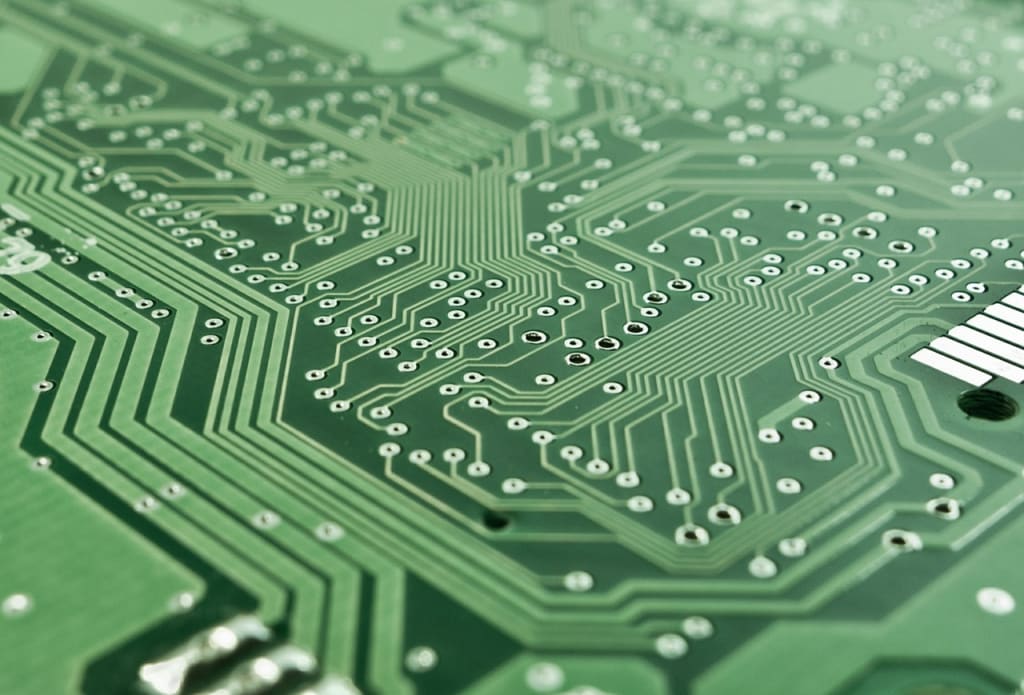Pulling Rank: The Power of the Engineering Mind Through Capitalism Listed from Planes in the Sky to Smartphones in Hand
For today's products that we take for granted, their makers ought to be venerated.

Think about cars being bought. Do most consumers know where their catalytic converter is or its function? If the answer is no, there’s good reason for that. It is because the buyer didn’t purchase the vehicle to be an expert on exhaust systems. He or she wanted to purchase a car or truck to get around places and to haul precious cargo. The dollars that they plunked down in order to obtain a vehicle stand as the factor that permits them to go to a mechanic if they ever run into any problems. Most people are too busy worrying about the bills they must pay, the parents and or children that they must provide for (if the first case is worthy of it) and any other expenses that might arise.
The majority of people never think about, in their lifetime, the important aspects that make up the pieces of the vessels and devices that have revolutionized the modern era. The “magic” that some would say or the “miracles” that others would hold are really the minds of the greatest individuals of this age. American exceptionalism lies in the thought processes of the men and women who, for their own self-interest, in turn changed the lives of millions in America and billions around the world. For all of the hype that athletes and actors get (some for good reason), there are legions of engineers who may never receive the recognition that they deserve.
The way to consider all of this is to see how capitalism works. It can take a product that has to be made, developed, and devised and make it part of something that can be easily accessed. Cars, trucks, airplanes, homes and offices, and smartphones all consist of complex systems that the user may or may not care to even know about. Most people just want whatever vehicle or gadget to work. But that is the power of capitalism. There’s a system and a professional field designed to accommodate the user so that he or she doesn’t have to worry about whether that new sedan or smartwatch is equipped with a power steering line or enough chips to power the small device. So, get your flight tickets, home renovations, and smart gadgets for Pulling Rank: The Power of the Engineering Mind Through Capitalism from Planes in the Sky to Smartphones in Hand.
In all of the thousands of flights which take place in America, the goal is to get passengers from point A to point B. They probably don’t care about the weight of the plane, the speed at which it flies, or the amount of jet fuel that is injected into it. They just want to see their family in Honolulu. Now, of course there are knowledgeable passengers who may know the ins and outs of the plane. He or she may be an avid enthusiast of aviation technology and might even hold a degree or two in aerospace engineering. Thanks to the sketches of Leonardo Da Vinci’s "Flying Machine" and the thoughts and actions of the Wright brothers, humanity has been able to take to the air.
The vast majority of passengers seek to enjoy a comfortable ride. The fact that they might’ve paid hundreds or even thousands of dollars in order to fly may be of prime concern to them. So any considerations of the data or specifics of the flight remain irrelevant to them. The ones engaged with the details of the plane and the flight plan sit up front in the cockpit. Capitalism permits the passenger to trade his or her own smart earned cash for the chance to experience a safe, even fun trip. Creature comforts such as meals, in-flight movies, adjustable seats, Wi-Fi, and extra legroom all constitute the consequences of capitalism.
The simple fact that airplanes are crafted based on intricate systems and still allow anyone the ability to fly is a testament to the semi-free market system. The understanding, the years of practicing, the tests, and all of the training that had to go into constructing the plane, testing it out, and hiring engineers and pilots to keep the things in the sky all rest on the reality of semi-free men and women doing what they love to do. The passengers are secondary. They become the afterthought in the chain of thinking. Of course, they are an essential part of the equation. They’ve provided the funds that supplement the lives of these engineers and pilots. But they don’t do it for the people who they cart around the country and the globe. Their selfishness lies in the beauty of engaging their minds to create situations that are conducive for their clients but at the same time brings them joy.
Pilots and the rest of the crew get paid for their expertise, customer service, and dedication to quality. They’re representatives of the school of thinking for self only. If they thought about passengers first, then the rates would be in the tens of dollars, every flight would be first class or better, and there would be no layovers. The system of capitalism prevents all of this from happening, for good reason. The airlines would go broke, there would be strikes and shortages of professionals in the air and on the ground, and there would be mass chaos.
With the thought plan behind the exchange of dollars according to economics 101 (supply and demand), no one has to worry about the airline industry descending into mass hysteria. Though, there remain some hiccups here and there among the industry. And, yes, the TSA can be a nuisance, but, for the most part, the entire experience of flying is glorious.
The joke about architecture goes something like “What is architecture? You’re living in it!” From mud huts to mansions and everything in between, the human mind has crafted dwelling spaces. Whether it’s a bunker underground or a towering skyscraper, the architects behind these structures usually go unnamed. There are a few standouts like Gehry and Pei, but, for the rest of the Pritzker Prize winners, they remain relatively nameless. But their works speak for themselves. Grand cathedrals and modest homes don’t collapse upon themselves without some major cataclysm. This is due to the diligence and devotion of architects. The real life Howard Roarks from Ayn Rand’s The Fountainhead (1943) have provided the world with the ability to have a roof over their heads.
The best architects don’t do their work out of altruistic causes. These men and women do it for self-interest. They seek to see the world transformed with every new and innovative way: to transform materials from the earth into something completely different. To shape the world in their image is their passion, their pride. What they can do with wood, steel, concrete, and glass is remarkable. The average homeowner or occupant of a high rise may not know the difference between a Doric column or a balustrade—but the architect does.
The capitalistic creator concerns him or herself with their work only. They find that any dealings with customers is marginal. Their priority is making sure that the practical and aesthetic values match. They are tasked with forming from nothing excellent homes and office buildings and museums to list a few. When it comes to designing buildings, it is their integrity that shines through. That’s the trade. Architects deliver a product that is safe, reliable, and beautiful. The client receives this work of genius (in great architects) and expects the structure to stand firm against years of weather and other calamities that may arise. The money that is handed over to the creator of the building is a symbol that they’ve performed an exemplary undertaking and should be rewarded for their performance.
Most structures don’t just get carried off into the wind. Unless some ugly event mars or destroys them, they withstand decades even centuries of exposure to the elements. Architects ensure that the buyer of the space that they made is happy. But that joy must first originate in the maker. Every architect ought to delight in the fact that they uplift the human race, but what is more important is that they enrich (both spiritually and monetarily) themselves.
The fact that some smartphones have burst into flames has not stopped the millions of people who clutch onto their smartdevice. Besides, that’s not the intention of the builder behind the smartphone. He or she envisions a supercomputer that can not only fit in your pocket but tell you your weight, the weather, what movies to watch, and what music to listen to, just to name a few applications of what these modern wonders afford.
Sands could be seen as just dunes of nothingness stretching throughout the beaches and deserts of the world. Engineers look at this sand and say that they can transform it into glass to cover smartphones. With all of the circuitry and mastery that goes into crafting a smartphone, it takes hours and hours of thought. Each of the specialists who team up to create such a wondrous product as a smartphone should be lauded for their efforts.
For a reasonable price, the poorest of Americans are given the opportunity to witness greatness every time that they answer a call or order a pizza. The best way to appreciate a smartphone is to learn just what components comprise such an ornate system. They ought to discover the components of the phone. Or not. They may just continue to make and send money through the phone or ask the assistant for directions to a park or other venue. That is the grace of the world: the ability to either know everything about the mechanics of a device or only the applications that it provides.
By taking into account all of the various ways that a smartphone can be utilized, only under the umbrella of capitalism could such a society be able to receive such devices. Each man and woman is free to choose which plan is suitable to their needs, what style, color, and amount of memory that they wish to have incorporated into the device. There is no fear that the phone will explode. Even if this occurs, insurance companies take up the burden of being injured or sustaining a defective device. The focus ought to remain on the power that these devices yield, not their possible capacity to turn into bombs.
The engineers who have poured in hours of knowledge into forming these devices ought to be lauded, as well. The confluence of ideas that streamed into these devices should not be overlooked. Praise is due to the fact that a buyer will want to trade forty or fifty dollars for an eight hundred dollar phone. Why? The amount of work that is required to produce these modern marvels calls for the sweat equity and extreme brain power. All of the near-field communication controllers that go into multiple phones should be revered as absolute products of the mind.
Lee Kun-hee, chairman of Samsung ought to sense great pride for the products that have been woven into the lives of so many people across the globe. Without the guidance, dexterity, and comprehension of individuals like him, we may not be able to see the day when smartphones (other than Apple) could collaborate or compete. Lee’s discipline is to himself. He’s amassed a multi-billion-dollar fortune not on the backs of servants who are forced to produce the circuit boards and yes, the glass. Instead, Lee and his ilk ought to take pride in the fact that they have made a great life for themselves. As a consequence, billions of people have reaped the rewards of using technical wonders.
It is never about a service that is “greater than oneself” when it comes to generating such devices. It is about the selfish devotion to see to it that the products be available. It is the selfishness that propels the individual to make something great but not above their own interests. The exchange which occurs between the maker and the buyer is the relationship of the Trader Principle. This relationship says that both parties win. And that’s the gorgeousness of trade.
About the Creator
Skyler Saunders
Cash App: $SkylerSaunders1
PayPal: paypal.me/SkylerSaunders
Join Skyler’s 100 Club by contributing $100 a month to the page. Thank you!






Comments
There are no comments for this story
Be the first to respond and start the conversation.